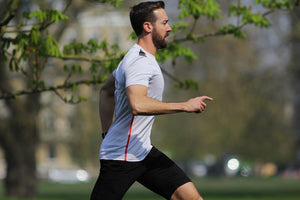
Functional fitness is designed to focus your training on improving daily function. What’s functional will differ from person to person, as what we do in our daily lives is different. So, is functional fitness right for you?
What’s not functional fitness?
Functional training was originally focused on developing better movement quality and exercises like two-legged jumps and wood chops reflect this. However, not every crazy exercise you see people doing in the gym is worth copying. You may see people balancing on a Bosu ball throwing dumbbells around or balancing on one leg. This is not functional fitness as it does not prepare you for everyday movements or sports.
It's important to remember that the point of functional training is to condition your body for a particular task or exercise, such as a golfer doing cable twists to improve their drive or a footballer doing fast-feet movements to improve their footwork.

Functional Fitness vs Bodybuilding
Can you incorporate functional fitness into a bodybuilding routine? The answer is yes. Functional fitness is not the sworn enemy of bodybuilding and in fact many bodybuilding compound lifts, such as the squat and deadlift, are adapted into functional training regimes. Where the two differ is with their focus on isolation and aesthetics. Bodybuilding focuses on the way muscles look whereas functional fitness is about how the muscles move. Therefore, bodybuilding workout routines will feature many more isolating exercises like bicep curls and lat pull downs, while functional fitness incorporates more compound movements like squat jumps and burpees.
What are the benefits of functional fitness?
Functional training gets you moving
Typically, most people spend a shocking 9-12 hours sitting down. If you work in an office, chances are you sit down for most of the day, so when you get to the gym you want to be up and moving, not sitting on machines doing isolated exercises. Functional fitness requires you to get up and to move in multiple planes of motion. Simply standing rather than sitting increases calorie expenditure and encourages better sugar metabolism. Plus, you will feel so much better after a day spent fully sedentary if you can really get your heart rate up and feel the burn during a high intensity workout.
It improves posture
Unfortunately for most of us, the stress of modern life and the pressures of our jobs aren't great for our posture. Ever feel like you have the weight of the world on your shoulders? A hunched over back and slumped over shoulders are more common than not and it’s not good for our health. Functional fitness can improve your posture by working on muscles slings and how muscles work together. Releasing tension from the chest, for example, can help to draw back the shoulders and correct posture.
Better fat burn
Functional training burns much more fat than steady-state cardio or bodybuilding because your whole body is moving. Incorporating multi-plane, multi-joint and multi-muscle movements means high fat-burning as well as better all-round fitness. Functional training movement patterns crank up your heart rate and keep your body burning lots of calories well after your workout is over.
Improved flexibility
Can you touch your toes? No? Time to get functional. Functional training can help to develop your flexibility by developing a better range of motion in movement patterns we use in everyday life.The whole point of functional training is to replicate the body’s natural planes of motion. Contracting muscles is one aspect, but it’s equally important to stretch muscles effectively to help increase flexibility.
It is a meaningful workout
Whilst training to look good can be important on a personal level, functional training can give you a better quality of life. Functional fitness is about training to improve your life on a daily basis and this is especially important as we get older. Functional training is designed to improve the things we do every day such as keeping up with our children or bending down to load a washing machine.

It won't get boring
Training functionally keeps workouts varied and will stop you from getting fed up with going to the gym. Instead of being restricted to training one muscle group in particular and always doing the same exercises, functional training focuses on whole body integration and there are endless possibilities to fun and interesting exercises you can do.
You’ll build more muscle
Functional training incorporates a variety of different pieces of kit as well as body weight, stimulating different muscle fibres and promoting further muscle growth. Lean muscle burns more calories at rest than fat, as well as pulling against the bone to increase bone density.

Functional Training Round - Up
- Functional training incorporates weaker muscle groups which are often neglected.
- Functional training ensures you are fit enough to perform daily activities.
- Functional training can correct posture and improve flexibility.
So, if you'd like to be able to run after your kids, do daily chores, and move with ease, functional training is for you. Especially if you are chained to a desk all day at work, functional fitness could really improve your quality of life and set you up to be more mobile as you grow older.



